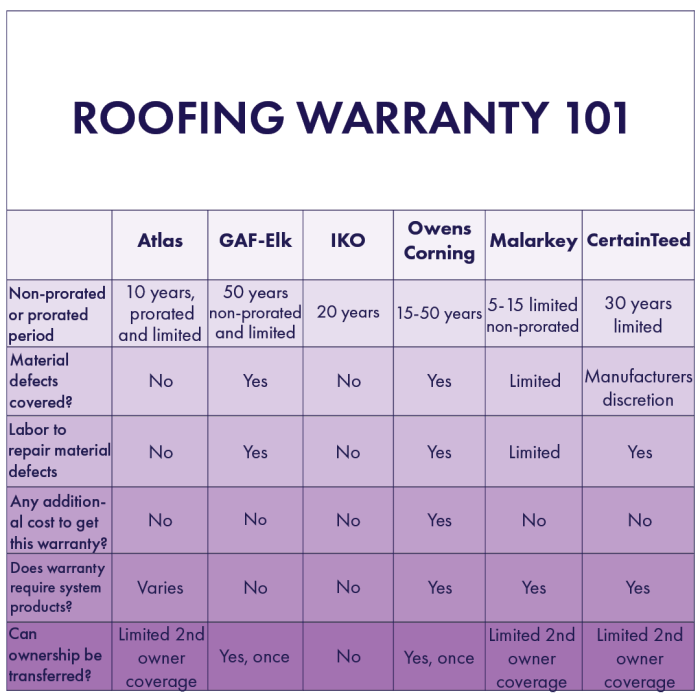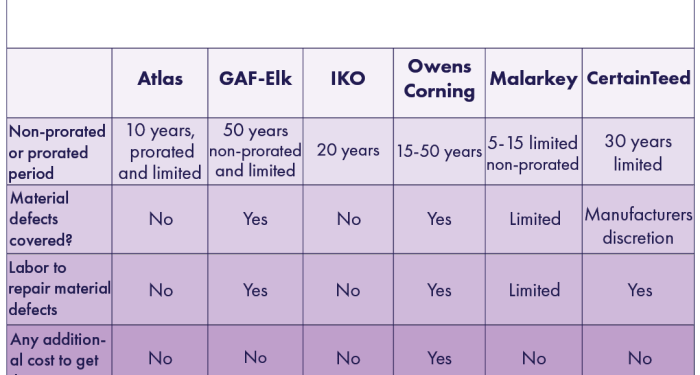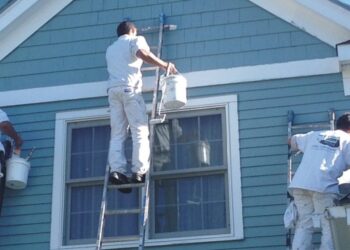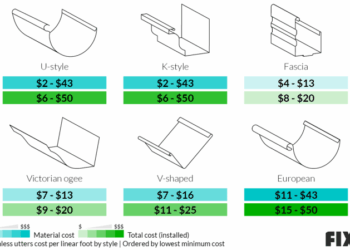Diving deep into the realm of roofing warranty options, this introduction sets the stage for an enlightening exploration of the various types of warranties available in the market. From manufacturer warranties to workmanship warranties, we'll uncover the nuances and key differences that every homeowner should be aware of.
As we delve further, we'll also shed light on the coverage details, length variations, transferability, limitations, and maintenance requirements associated with roofing warranties. By the end of this guide, you'll have a solid understanding of how to navigate the complex world of roofing warranty options with confidence.
Types of Roofing Warranties
Roofing warranties play a crucial role in protecting your investment and providing peace of mind. There are different types of warranties available in the market, each serving a specific purpose.Manufacturer warranties are typically included with the roofing materials and cover defects in the product itself.
These warranties can range from 20 to 50 years or more, depending on the quality of the materials. They usually protect against issues like premature cracking, splitting, or warping.On the other hand, workmanship warranties are offered by roofing contractors and cover the installation process.
These warranties ensure that the roofing system is installed correctly and protect against issues like leaks or improper flashing. Workmanship warranties are usually shorter in duration compared to manufacturer warranties, typically ranging from 1 to 10 years.
Common Warranty Options
- Manufacturer Warranty: Covers defects in the roofing materials.
- Workmanship Warranty: Covers installation-related issues.
- Limited Lifetime Warranty: Offers coverage for the lifetime of the product.
- No Dollar Limit Warranty: Provides full replacement cost without a dollar limit.
- Prorated Warranty: Decreases in coverage value over time.
Coverage Details
When considering a roofing warranty, it's crucial to understand what is included in the coverage to ensure protection for your investment. A comprehensive roofing warranty should encompass various aspects to provide adequate support in case of any issues.
Inclusions in a Comprehensive Roofing Warranty
- Material Defects: A good warranty should cover any defects in the roofing materials used during installation.
- Workmanship: The warranty should also address any errors in workmanship that may lead to issues with the roof.
- Leak Protection: Coverage for leaks and water damage is essential to safeguard your home from potential harm.
- Wind and Hail Damage: Many warranties include protection against damage caused by severe weather conditions.
- Transferability: Some warranties are transferable, which can add value to your home if you decide to sell.
Common Exclusions in Roofing Warranties
While roofing warranties offer valuable protection, it's equally important to be aware of common exclusions that may limit coverage. Understanding these exclusions can help you manage expectations and take necessary precautions.
- Improper Installation: Warranties often do not cover issues arising from improper installation by unqualified contractors.
- Misuse or Neglect: Damage caused by misuse, neglect, or lack of proper maintenance may not be covered under the warranty.
- Natural Disasters: Some warranties exclude coverage for damage caused by natural disasters like earthquakes or floods.
- Unauthorized Repairs: Making repairs without prior approval from the warranty provider can void the warranty.
- Normal Wear and Tear: Gradual wear and tear over time may not be covered under the warranty.
Importance of Reading the Fine Print
Reading the fine print in warranty coverage details is vital to fully understand the terms and conditions of the agreement. It helps you grasp the extent of coverage, exclusions, limitations, and any requirements to maintain the warranty validity.
Length of Warranty

When it comes to roofing warranties, the length of coverage can vary depending on several factors, such as the materials used and the contractor providing the warranty. It's important to understand how the length of a warranty can impact the overall value and level of protection for your roof.
Varying Lengths of Warranties
Different roofing materials and contractors may offer varying lengths of warranties. For example, asphalt shingle roofs typically come with warranties ranging from 15 to 30 years, while metal roofs may have warranties lasting 30 to 50 years. Additionally, some contractors may offer extended warranties for an additional cost, providing coverage beyond the standard warranty period.
Does Longer Warranty Mean Better Coverage?
While a longer warranty may offer more extended coverage in terms of years, it doesn't always mean better protection. The quality of materials, workmanship, and the reputation of the contractor are equally important factors to consider. A longer warranty may provide peace of mind, but it's essential to ensure that the warranty terms cover potential issues that may arise during the lifespan of your roof.
Impact on Overall Value
The length of a roofing warranty can impact the overall value of your investment in several ways. A longer warranty may increase the resale value of your home, as it provides assurance to potential buyers that the roof is protected.
Additionally, a warranty that covers a more extended period can save you money on repairs or replacements if issues occur after the initial installation. However, it's crucial to carefully review the warranty terms and conditions to understand what is and isn't covered to make an informed decision about the value it provides.
Transferability and Limitations
Transferable warranties play a significant role in the roofing industry as they provide homeowners with the flexibility to transfer the warranty to a new owner if they decide to sell their property. This can be a valuable selling point and give potential buyers peace of mind knowing that the roof is protected by a warranty.Limitations may be present in roofing warranty options, such as exclusions for certain types of damage or requirements for regular maintenance to keep the warranty valid.
It is essential for homeowners to carefully review the terms and conditions of the warranty to understand what is covered and any limitations that may apply.
Tips for Navigating Limitations in Warranties
- Read the warranty carefully: Take the time to thoroughly review the terms and conditions of the warranty to understand what is covered and any limitations that may apply.
- Follow maintenance requirements: To ensure the warranty remains valid, make sure to adhere to any maintenance requirements Artikeld in the warranty.
- Keep records: Keep records of any maintenance or repairs done on the roof, as this may be required to file a claim in the future.
- Consult with a professional: If you have any questions or concerns about the warranty, consider consulting with a roofing professional for clarification.
Maintenance Requirements
When it comes to roofing warranties, maintenance requirements are a crucial aspect that homeowners need to pay attention to. Adhering to these requirements can have a significant impact on the validity of your warranty and ensure that you are covered in case of any issues that may arise.
Importance of Regular Maintenance
Regular maintenance of your roof, such as annual inspections, cleaning gutters, and replacing damaged shingles, is essential to prolonging the lifespan of your roof and preventing costly repairs down the line. Failure to properly maintain your roof can lead to issues like leaks, mold growth, and structural damage.
- Regular inspections: Schedule annual inspections by a professional to identify and address any potential issues before they escalate.
- Cleaning gutters: Ensure that gutters are clear of debris to prevent water buildup and potential water damage.
- Replacing damaged shingles: Promptly replace any damaged or missing shingles to maintain the integrity of your roof and prevent leaks.
Remember, neglecting regular maintenance can void your roofing warranty, leaving you responsible for any repairs or replacements that may be needed.
Final Thoughts
In conclusion, roofing warranty options are a crucial aspect of any homeowner's investment in their property. By being well-informed about the types of warranties available, their coverage details, and maintenance requirements, you can ensure that your roof remains protected for years to come.
Remember, a little knowledge about roofing warranties can go a long way in safeguarding your home against unexpected issues.
Query Resolution
Are all roofing warranties transferable?
Not all roofing warranties are transferable. It depends on the terms and conditions set by the manufacturer or roofing company.
Does a longer warranty always mean better coverage?
Not necessarily. While a longer warranty period can offer extended protection, the coverage details and exclusions are what truly determine the quality of the warranty.
What happens if I neglect the maintenance requirements in my roofing warranty?
Neglecting maintenance requirements can void your roofing warranty, leaving you unprotected in case of any damage or issues.
How do limitations in roofing warranties affect homeowners?
Limitations in warranties can restrict the scope of coverage, so homeowners need to understand these limitations to make the most of their warranty benefits.












